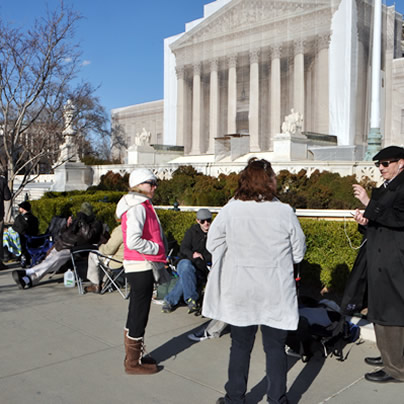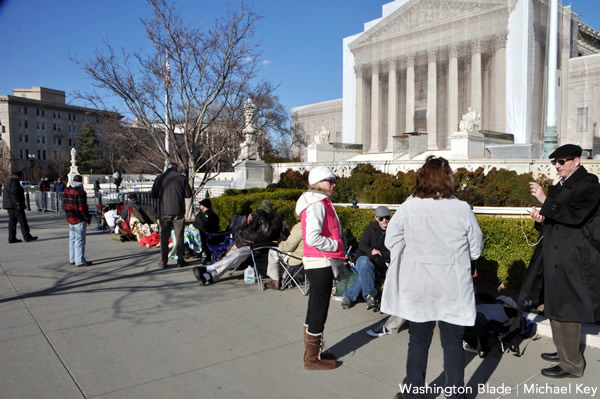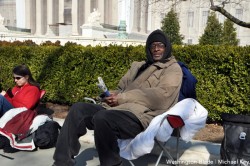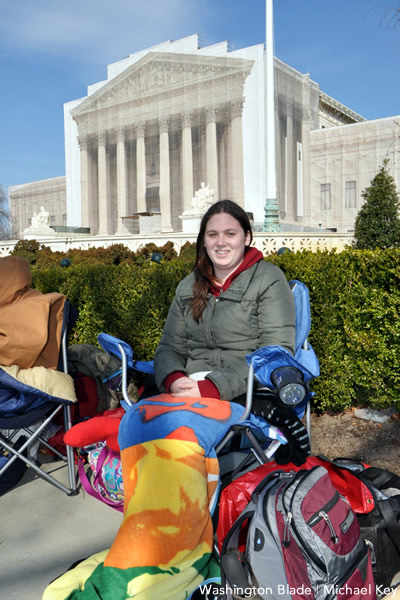National
Supporters camp out for 3 days awaiting marriage cases
Undaunted by snow forecast, some determined to see Supreme Court in action


A line formed at the Supreme Court on Saturday in anticipation of oral arguments in the marriage cases. (Washington Blade photo by Michael Key)
Three days before justices will hear oral arguments on California’s Proposition 8, supporters of marriage equality were already lined up before the U.S. Supreme Court on Saturday to ensure they’ll have a seat for the historic event.
Jeffrey DeSoto, a gay 33-year-old computer programmer from New York, stood cross-legged in line next to his sign reading: “I AM A 2ND CLASS CITIZEN: NOH8.” Near him was his sleeping bag, air mattress, blanket and solar cell to charge his cell phone.
“New York State does have marriage equality, but I would want marriage equality across the entire country,” DeSoto said. “That’s an outside outcome to this, but it is there, so I definitely would want to have been at the case where that happens.”
Jordan Haedtler, a straight 24-year-old resident of Oakland, Calif., said he’s closely watched the Prop 8 case, Hollingsworth v. Perry, from its beginnings and attended oral arguments in the case when they were before the U.S. Ninth Circuit Court of Appeals.
“I’m kind of a public policy and politics junkie,” Haedtler said. “I’ve been to several oral arguments in other cases as well, but this case holds a lot of importance for me because I really think that gay rights and marriage equality are one of the main civil rights issues of our time.”
As of Saturday afternoon, about 15 people were camped out outside the building awaiting entry to Tuesday’s hearing. Wearing coats and hats to keep warm in a lingering winter cold, those in line occupied themselves with journal writing, conversation and newspaper reading to pass the time.
For DeSoto, simply coming early on Tuesday morning wasn’t enough. He arrived Friday afternoon to wait in line before the Supreme Court with days remaining before the arguments for an assurance he would have access to the courtroom.
“Actually, I did a little research,” DeSoto said. “I found the names of people who waited in line for the Affordable Care Act, and then I found them on Facebook and messaged a couple of them. One girl messaged me back, and I asked her how far in advance she had come. I think she said four days, so I pretty much tried to match that.”
DeSoto said those waiting in line have a “good amount of camaraderie.” As if living in a commune on the sidewalk of First Street, he said they’re offering food to each other and keeping an eye on each other’s possessions as they wait.
Among them are a gay couple seeking a ruling in favor of their marriage rights; college students with an affinity for legal cases and equality issues; a group of older black men at the front of the line played a game of dominoes to pass the time.

D.C. resident Tyrone Henderson supports marriage equality. (Washington Blade photo by Michael Key)
Tyrone Henderson, a 48-year-old D.C. resident, talked about his personal support for marriage equality as he glanced over the Metro section of the Washington Post.
“I think people should have the choice of what they want to do,” Henderson said. “You should be able to be with who you want to be with instead of trying to predict who you should be with. I figure you should have the choice whether you want to marry a man or a woman.”
Each of the people in line was a supporter of marriage equality. No opponents of marriage rights for gay couples were waiting outside and braving the chilly weather to attend the arguments. There was one protester who was wearing a sandwich sign, but he was speaking out against the Obama administration’s extrajudicial killing of suspected terrorists overseas by drone attack.
DeSoto said he was heckled by a passer-by who deemed marriage rights for gay couples an unimportant issue.
“I did have one person come by — a heckler, a dissident, whatever,” DeSoto said. “He didn’t like my sign. He pretty much said marriage equality was not a serious issue and that we’re all throwing a hissy fit.”
Those in line were also undaunted by weather reports indicating that they would be snowed upon as they awaited a place in the courtroom. Differing forecasts ranged from cold rain to a few inches of snow on Sunday and Monday.

Darienn Powers came from New York to watch the Prop 8 oral arguments. (Washington Blade photo by Michael Key)
Darienn Powers, a 19-year-old straight student from the State University of New York at New Paltz, said she came early in the morning on Saturday prepared in the event of inclement weather.
“I’ve heard that it might be snowing,” Powers said. “I’m wearing my rubberized rain boots, so my feet will be dry, and I have an umbrella. Otherwise, I’m just taking it as it comes.”
A common theme among those waiting in line was a plan to stay for oral arguments for Prop 8 on Tuesday, but leave without attending the arguments on Wednesday for the Defense of Marriage Act. The reasoning — aside from the need to return to work — was the belief the Prop 8 proceedings were more historic than the DOMA case.
Still, that didn’t take away from the historic nature of what they’d be able to see on the first day of oral arguments on marriage equality.
Dexter Smith, a gay junior political science major at Georgia State University, said he expects an intense experience on that day for those on both sides of the marriage equality movement.
“I think it’s going to be packed,” Smith said. “You’re going to have protesters out here. People saying crazy things; you already having people saying crazy things. It’s going to be crazy, and I just want to be here to be in the thick of things.”
U.S. Supreme Court
Supreme Court to consider bans on trans athletes in school sports
27 states have passed laws limiting participation in athletics programs

The U.S. Supreme Court on Thursday agreed to hear two cases involving transgender youth challenging bans prohibiting them from participating in school sports.
In Little v. Hecox, plaintiffs represented by the ACLU, Legal Voice, and the law firm Cooley are challenging Idaho’s 2020 ban, which requires sex testing to adjudicate questions of an athlete’s eligibility.
The 9th U.S. Circuit Court of Appeals described the process in a 2023 decision halting the policy’s enforcement pending an outcome in the litigation. The “sex dispute verification process, whereby any individual can ‘dispute’ the sex of any female student athlete in the state of Idaho,” the court wrote, would “require her to undergo intrusive medical procedures to verify her sex, including gynecological exams.”
In West Virginia v. B.P.J., Lambda Legal, the ACLU, the ACLU of West Virginia, and Cooley are representing a trans middle school student challenging the Mountain State’s 2021 ban on trans athletes.
The plaintiff was participating in cross country when the law was passed, taking puberty blockers that would have significantly reduced the chances that she could have a physiological advantage over cisgender peers.
“Like any other educational program, school athletic programs should be accessible for everyone regardless of their sex or transgender status,” said Joshua Block, senior counsel for the ACLU’s LGBTQ and HIV Project. “Trans kids play sports for the same reasons their peers do — to learn perseverance, dedication, teamwork, and to simply have fun with their friends,” Block said.
He added, “Categorically excluding kids from school sports just because they are transgender will only make our schools less safe and more hurtful places for all youth. We believe the lower courts were right to block these discriminatory laws, and we will continue to defend the freedom of all kids to play.”
“Our client just wants to play sports with her friends and peers,” said Lambda Legal Senior Counsel Tara Borelli. “Everyone understands the value of participating in team athletics, for fitness, leadership, socialization, and myriad other benefits.”
Borelli continued, “The U.S. Court of Appeals for the Fourth Circuit last April issued a thoughtful and thorough ruling allowing B.P.J. to continue participating in track events. That well-reasoned decision should stand the test of time, and we stand ready to defend it.”
Shortly after taking control of both legislative chambers, Republican members of Congress tried — unsuccessfully — to pass a national ban like those now enforced in 27 states since 2020.
Federal Government
UPenn erases Lia Thomas’s records as part of settlement with White House
University agreed to ban trans women from women’s sports teams

In a settlement with the Trump-Vance administration announced on Tuesday, the University of Pennsylvania will ban transgender athletes from competing and erase swimming records set by transgender former student Lia Thomas.
The U.S. Department of Education’s Office for Civil Rights found the university in violation of Title IX, the federal rights law barring sex based discrimination in educational institutions, by “permitting males to compete in women’s intercollegiate athletics and to occupy women-only intimate facilities.”
The statement issued by University of Pennsylvania President J. Larry Jameson highlighted how the law’s interpretation was changed substantially under President Donald Trump’s second term.
“The Department of Education OCR investigated the participation of one transgender athlete on the women’s swimming team three years ago, during the 2021-2022 swim season,” he wrote. “At that time, Penn was in compliance with NCAA eligibility rules and Title IX as then interpreted.”
Jameson continued, “Penn has always followed — and continues to follow — Title IX and the applicable policy of the NCAA regarding transgender athletes. NCAA eligibility rules changed in February 2025 with Executive Orders 14168 and 14201 and Penn will continue to adhere to these new rules.”
Writing that “we acknowledge that some student-athletes were disadvantaged by these rules” in place while Thomas was allowed to compete, the university president added, “We recognize this and will apologize to those who experienced a competitive disadvantage or experienced anxiety because of the policies in effect at the time.”
“Today’s resolution agreement with UPenn is yet another example of the Trump effect in action,” Education Secretary Linda McMahon said in a statement. “Thanks to the leadership of President Trump, UPenn has agreed both to apologize for its past Title IX violations and to ensure that women’s sports are protected at the university for future generations of female athletes.”
Under former President Joe Biden, the department’s Office of Civil Rights sought to protect against anti-LGBTQ discrimination in education, bringing investigations and enforcement actions in cases where school officials might, for example, require trans students to use restrooms and facilities consistent with their birth sex or fail to respond to peer harassment over their gender identity.
Much of the legal reasoning behind the Biden-Harris administration’s positions extended from the 2020 U.S. Supreme Court case Bostock v. Clayton County, which found that sex-based discrimination includes that which is based on sexual orientation or gender identity under Title VII rules covering employment practices.
The Trump-Vance administration last week put the state of California on notice that its trans athlete policies were, or once were, in violation of Title IX, which comes amid the ongoing battle with Maine over the same issue.
New York
Two teens shot steps from Stonewall Inn after NYC Pride parade
One of the victims remains in critical condition

On Sunday night, following the annual NYC Pride March, two girls were shot in Sheridan Square, feet away from the historic Stonewall Inn.
According to an NYPD report, the two girls, aged 16 and 17, were shot around 10:15 p.m. as Pride festivities began to wind down. The 16-year-old was struck in the head and, according to police sources, is said to be in critical condition, while the 17-year-old was said to be in stable condition.
The Washington Blade confirmed with the NYPD the details from the police reports and learned no arrests had been made as of noon Monday.
The shooting took place in the Greenwich Village neighborhood of Manhattan, mere feet away from the most famous gay bar in the city — if not the world — the Stonewall Inn. Earlier that day, hundreds of thousands of people marched down Christopher Street to celebrate 55 years of LGBTQ people standing up for their rights.
In June 1969, after police raided the Stonewall Inn, members of the LGBTQ community pushed back, sparking what became known as the Stonewall riots. Over the course of two days, LGBTQ New Yorkers protested the discriminatory policing of queer spaces across the city and mobilized to speak out — and throw bottles if need be — at officers attempting to suppress their existence.
The following year, LGBTQ people returned to the Stonewall Inn and marched through the same streets where queer New Yorkers had been arrested, marking the first “Gay Pride March” in history and declaring that LGBTQ people were not going anywhere.
New York State Assemblywoman Deborah Glick, whose district includes Greenwich Village, took to social media to comment on the shooting.
“After decades of peaceful Pride celebrations — this year gun fire and two people shot near the Stonewall Inn is a reminder that gun violence is everywhere,” the lesbian lawmaker said on X. “Guns are a problem despite the NRA BS.”
-

 U.S. Supreme Court1 day ago
U.S. Supreme Court1 day agoSupreme Court to consider bans on trans athletes in school sports
-

 Out & About1 day ago
Out & About1 day agoCelebrate the Fourth of July the gay way!
-

 Maryland4 days ago
Maryland4 days agoSilver Spring holds annual Pride In The Plaza
-

 Opinions4 days ago
Opinions4 days agoSupreme Court decision on opt outs for LGBTQ books in classrooms will likely accelerate censorship












